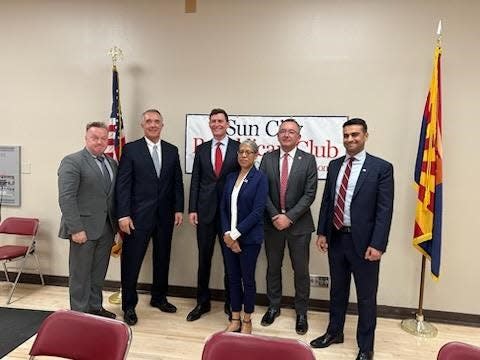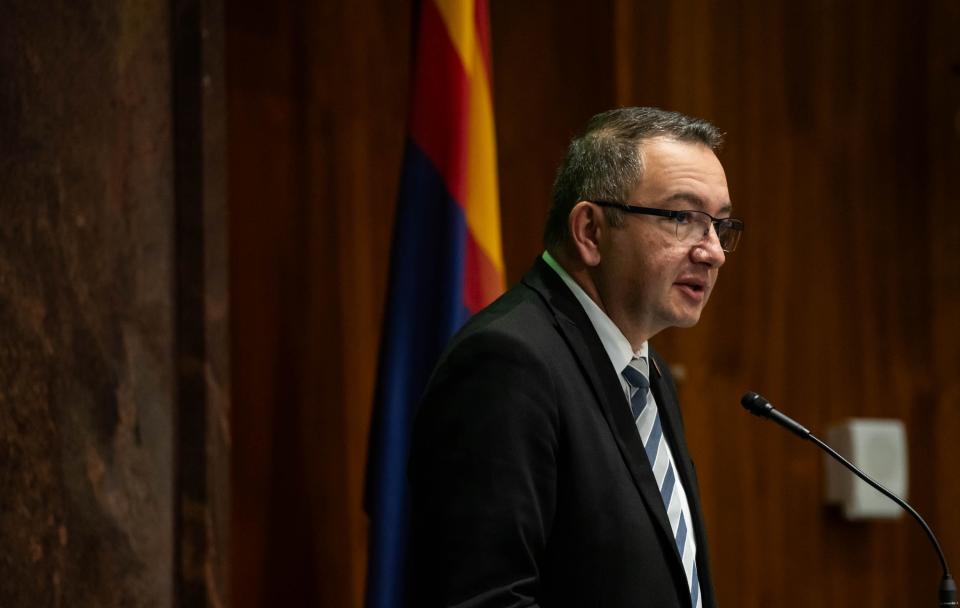West Valley GOP congressional candidates clash over how to govern, election integrity
- Oops!Something went wrong.Please try again later.
- Oops!Something went wrong.Please try again later.
The leading Republicans hoping to replace Rep. Debbie Lesko in Arizona’s 8th Congressional District are lockstep on most issues, but their approach to governance and their level of enthusiasm for discredited election challenges set them apart.
Five GOP candidates running to succeed the retiring Lesko, R-Ariz., in Congress convened in Sun City Tuesday for a 90-minute-long debate that revealed the candidates’ profoundly different approaches to the job of U.S. representative. Some said they would break ranks to push the House Republican caucus towards the right if needed, and others argued that the strategy has set the party back.
It’s an urgent question facing the House GOP caucus because the party’s right flank has grown more willing to frustrate the agenda of its more moderate leadership.
The discussion also showed the daylight between three candidates who touted as bona fides their objections to U.S. elections integrity, and the other two, who treaded more cautiously around claims of election fraud.
The event was hosted by the Sun City Republican Club and moderated by Chris Herring, a former Maricopa County Republican chair.
In attendance were the five front-runners in the crowded primary. They are Blake Masters, a venture capitalist and the 2022 GOP nominee for U.S. Senate; Abe Hamadeh, a former captain in the U.S. Army Reserve who previously ran for Arizona attorney general; state Sen. Anthony Kern, R-Glendale; Arizona House Speaker Ben Toma, R-Glendale; and former U.S. Rep. Trent Franks, who resigned from the seat amid controversy in 2017.
Lesko was also in attendance. She delivered remarks before the forum and promoted her recent announcement that she would run for a seat on the Maricopa County Board of Supervisors, which oversees elections in Arizona’s biggest county.
Ben Toma: 'We have members shooting our own'

The candidates’ differences came into focus when Herring, the moderator, asked how they would help the Republican Party achieve its agenda in Congress.
Kern’s response: “We just have to do what’s right for the country, and not necessarily what’s right for the Republican agenda.”
“Just because they have an ‘R’ behind their name doesn’t necessarily mean they’re the right person for the job,” he said, adding by way of example that, unlike Lesko, he would have voted to oust former U.S. House Speaker Kevin McCarthy, R-Calif., because “he didn’t do what he promised.”
Speaking next, Toma, whom Lesko has endorsed, criticized that approach.
“Washington’s broken. We know that, in part, because we have members shooting our own half the time instead of remembering who the actual enemy is,” he said.
Toma said as state House speaker he has helped Arizona Republicans pass major pieces of legislation with a one-vote majority, such as the tax cuts he shepherded through the House in 2021.
“It’s important to fight. It’s important to have a backbone," he said later. "But at the end of the day, you have to look at, who has actually moved the ball forward? Not who has simply talked about moving the ball forward, but who has actually done it?”
Franks focused on the filibuster, a rule that effectively requires the Senate to have a 60-vote majority to pass most laws. While in Congress, he pressured the Senate’s leadership to weaken that rule.
Hamadeh suggested that former President Donald Trump’s reelection could unify the party, and that some members of Congress “may be a little bit more moderate for a reason” and “let’s make sure we get legislation that actually moves the economy and our country forward.”
Masters argued for a hardline approach, saying he would use media appearances to put pressure on other members of his party.
“You don’t do it by compromising,” he said. “I want to get (to Washington), and I want to drag the whole darn caucus to the right. … I will just expose whoever is blocking the right stuff. The instinct is to go there and compromise. We can never do that.”

Pressed after the debate on what McCarthy’s ouster delivered for Arizonans, Kern said: “It showed us, as a voter, two of the best congressmen that this country has,” referring to U.S. Reps. Eli Crane and Andy Biggs, both Arizona Republicans who voted with House Democrats to take the speaker's gavel from McCarthy.
"Bottom line is, when you start making deals with Democrats, and not listening to your Republican caucus, that’s not the right thing."
Some tout election challenges as bona fides
Numerous lawsuits across the country have failed to surface evidence of widespread fraud in U.S. elections. Still, several candidates boasted about their efforts disputing election integrity.
Hamadeh put the issue front and center in his opening remarks. The former candidate for Arizona attorney general said that he is still fighting the outcome of the election he lost in 2022 and has resisted pressure to drop the lawsuits. The fact that he “stood strong” helped earn him endorsements from Trump and the front-running U.S. Senate candidate Kari Lake, he said.
Kern emphasized that he was one of the individuals who in 2020 claimed to be legitimate electors for Trump, an effort that’s the subject of a probe by the Arizona Attorney General’s Office. Similar efforts in other states have been prosecuted.
Masters reprised an immigration conspiracy theory he promoted while running for Senate in 2022, which was criticized widely at the time for echoing the Great Replacement Theory, an idea first popular among white nationalists that there is a plot to diminish the political power of native-born Americans.
“The Dems are trying to replace you. They’re trying to steal your vote by diluting you with millions of third-world, illegal aliens,” Masters said at Tuesday’s debate.
Asked for evidence, Masters pointed to a segment by the conservative media personality Tucker Carlson that claimed the Democrats’ political agenda relies on demographic change. In the video, Carlson links California’s blue shift to a 1986 immigration reform law and quotes several Democrats saying that immigration will help swing areas blue.
Masters speculated of Democrats’ plans: “Bring in millions + give them amnesty (make them voters). Literally could not be more clear,” he wrote in a follow-up statement to The Arizona Republic.
Immigration-caused demographic changes have often helped the Democratic Party at the ballot box. Arizona’s burgeoning Latino population, for example, is thought to have helped tilt recent statewide elections toward Democratic candidates.
But experts say there is no evidence for a systematic, top-down conspiracy. The 1986 law Carlson identified as causing demographic shifts was signed into law by a Republican president, Ronald Reagan; and right now, the Democratic Party’s hold on immigrant voters appears to be slipping.
Toma, Franks more circumspect on election integrity
The two other candidates present at the debate, Toma and Franks, were more circumspect on the issue of election integrity.
Describing liberal groups’ opposition to his record, Toma mentioned he is among the Republican leaders challenging parts of the manual put forward by Democratic Secretary of State Adrian Fontes to guide election administration in Arizona.
Franks did not directly engage with other candidates’ claims about election integrity during the debate. Asked afterwards whether he believes Biden was the legitimate winner of the 2020 presidential election, he said that “ultimately, no,” listing among his arguments that swing states had laws on the books he believes were unconstitutional to begin with, that Democrats’ “ballot trafficking” efforts were in some cases illegal, and that the government’s communications with social media companies during the election helped the Democrats.
“Did they cheat? Yes. Did they do it quasi-legal? The argument can be made for that,” he said. “I don’t think Joe Biden fairly won the election.”
Laura Gersony covers national politics for the Arizona Republic. Reach her at 480-372-0389 or lgersony@gannett.com.
This article originally appeared on Arizona Republic: 8th Congressional District candidates spar over election integrity

